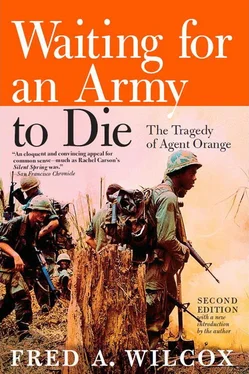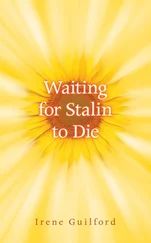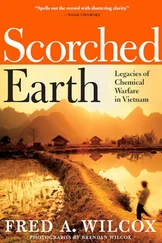Disappearing into his bedroom Anderson returns with a file drawer from which he removes reports, copies of rejection letters from the VA, and letters he has written to Congress, the VA, scientists, the president. “Do you realize,” asks Anderson, “that there are 125,000 Vietnam era veterans in jails or prisons and another 375,000 on parole, probation, or some other form of supervised release?” How many of these men, Anderson wonders, suffer from the sudden mood swings symptomatic of dioxin exposure? How many of the violent rages, which may have resulted in their incarceration, were due to the release of dioxin into their bloodstream during sudden weight losses—quite possibly causing psychological imbalances? More than 25 percent of all the inmates in state and federal penitentiaries are Vietnam veterans, but has anyone done a fat biopsy study to determine what percentage of these men might be carrying dangerous levels of TCDD-dioxin in their body fat? Could it be that we are paying millions of dollars each year to imprison several battalions of the first army in human history to be poisoned by its own government?
Holding up a recent edition of his hometown paper, Anderson points to a by-line which reads: “$2 Million for Agent Orange Studies Funded.” “The bulk of the reassigned money,” Anderson reads, his voice shaking with disgust, “will be used for the controversial epidemiological study the VA was ordered to do by Congress three years ago, as well as other Agent Orange projects the VA has planned.” Squinting at the paper, Anderson adds that the VA has decided to do “ten new research projects on Agent Orange.” The projects will be completed, according to Robert Nimmo of the VA, in five years. Tearing the article from the paper and folding it into squares, Anderson tosses the bulk of the paper into the woodstove. Then he turns and, with his back to the mirror, addresses me as though I were the only person to have remained for the final act of a very, very long play.
“Five years,” he says, “five more years. I think I’ve got it now. I think we’ve all got it now. They’re just waiting. They are waiting for us all, every fucking one of us, to die. ”
Are we really just waiting for an army to die? In a number of ways the Agent Orange issue is analogous to a murder trial where during the course of the proceedings the prosecutor produces a corpus delicti, witnesses to the crime, even a confession from the murderer, but all to no avail. The judge, for reasons about which one can only speculate, simply refuses to concede that a crime has been committed, dismissing members of the jury with the rather quaint admonishment that he may be calling on them again “in a few years.” If the VA denies that there is scientific evidence of the effects of TCDD-dioxin on human beings, and if its administrators continue to insist that Vietnam veterans cannot prove they were exposed to toxic chemicals, then how is it possible for veterans to present their case? In spite of the VA’s many rhetorical flourishes of concern, the issue, if one accepts the agency’s arguments, is a moot point for still another five years.
Perhaps it is time to remove the Agent Orange issue to another jurisdiction. One way to accomplish this would be for Congress to establish an independent board of inquiry comprised of world experts on toxic chemicals, physicians knowledgeable about the health effects of TCDD-dioxin, Vietnam veterans, and members of the legislature. By taking the entire matter out of the hands of the VA, the American taxpayer will save millions of dollars that might otherwise be spent on redundant studies, resolve some of the urgent questions that have gone unanswered for too many years and, most important, convince the men and women who served in Vietnam that their fellow countrymen do not consider them a “throwaway army.”
When asked why more hasn’t been done to resolve the Agent Orange issue and provide disability to the sick and dying, many veterans reply that the real issue is money. How much, they ask, are Vietnam veterans worth? And the answer is invariably the same: “As little as possible.” If the principal manufactures of herbicides and the federal government agree on anything, it is that neither wants to be stuck with the bill for compensating thousands of veterans for their illnesses. Other veterans see themselves as scapegoats for an unpopular war. In our haste to forget the pain and divisiveness of the Vietnam era, they say, we have chosen to simply forget about them. Finally, there are those who believe that the Agent Orange issue is a puzzle, with some of the pieces still missing. In time, they argue, a memo will surface from Washington and catapult the nation into an “Orangegate.” What had seemed for so many years a controversy will turn out to be a conspiracy.
Perhaps all of these explanations are true, but I think the real answer to why this tragedy continues was given to me one evening by a Vietnam veteran. “You know,” he said, “I don’t think they’ll ever really settle this thing because there’s just too much money involved. It’s gonna cost the chemical companies or the American government billions, and people just don’t think we’re worth that much. But I just want the American people to know something. They can write me and my children off if they want to. They can say we lost the war or we’re all crazy or any bullshit they like. But what they don’t know right now is that we are their future . What has happened to us will happen to them, and they better believe it because when it comes down, when they start to get sick, when their kids start to die and are born deformed or dead, they’ll wonder why they wouldn’t listen to us. I got nothing against anybody. I’m not as gung-ho as I was when I was eighteen, but this is still my country. But I just can’t understand why people don’t understand that what they dumped on us over there in Nam they’ll be dumping right here tomorrow. So when you go back to write your book, just tell people this: I may die, my brothers may die. Maybe we don’t really have any future, but if we don’t who the hell really does?”
Could it be that our willingness to ignore the suffering of thousands of Vietnam veterans is an attempt to avoid looking into our own future? Is it possible that in watching a twenty-eight-year old veteran like Paul Reutershan die of cancer we may be witnessing the death of our own son or daughter from the effects of radiation, dioxin, PCBs, or a host of chemicals that inundate our air and water and are contained in the very food we eat? Or that seeing a photograph of Kerry Ryan, born with sixteen birth defects, or Lori Strait, born with the left half of her brain missing, we are experiencing fears that, as future parents, we find unthinkable? But even if we choose to avoid looking at what has happened to Vietnam veterans, the fact remains that 50 percent of all US groundwater is either contaminated or threatened with contamination, that this year more deaths will be due to air pollution than car accidents, and that more children die in the United States each year from cancer than from any other disease.
On July 22, 1980, Christopher H. Johnson, a Vietnam veteran who had lost his right leg and part of his hearing in Vietnam, and whose son died after being born with multiple birth defects, told the Subcommittee on Medical Facilities and Benefits: “Don’t you think that it is only right to take care of the American men who supported you first. We are natural-born citizens of the United States of America. We have been reaching out for years for help. Now is the time for you to step forward and take the responsibility and appropriate action. Don’t leave us with the only benefit remaining, which is the burial benefit. A lot of Vietnam veterans have already used it much too early in life. The Vietnam veteran never had a chance to enjoy adulthood. Now I can’t enjoy growing old. The evidence and facts have been in for years. Agent Orange is a killer.”
Читать дальше











